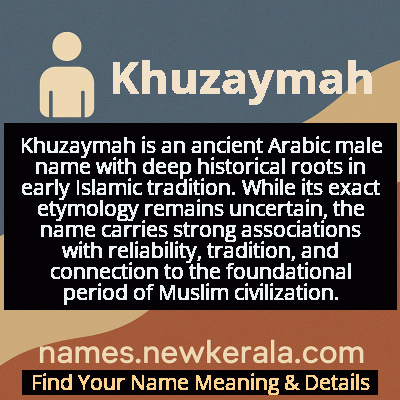Khuzaymah Name Meaning & Details
Origin, Popularity, Numerology Analysis & Name Meaning of Khuzaymah
Discover the origin, meaning, and cultural significance of the name KHUZAYMAH. Delve into its historical roots and explore the lasting impact it has had on communities and traditions.
Name
Khuzaymah
Gender
Male
Origin
Muslim
Lucky Number
6
Meaning of the Name - Khuzaymah
Khuzaymah is an ancient Arabic male name with deep historical roots in early Islamic tradition. While its exact etymology remains uncertain, the name carries strong associations with reliability, tradition, and connection to the foundational period of Muslim civilization.
Khuzaymah - Complete Numerology Analysis
Your Numerology Number
Based on Pythagorean Numerology System
Ruling Planet
Venus
Positive Nature
Harmonious, responsible, caring, and artistic.
Negative Traits
Overly idealistic, superficial, possessive, or jealous.
Lucky Colours
Pink, turquoise.
Lucky Days
Friday.
Lucky Stones
Diamond, turquoise.
Harmony Numbers
2, 3, 9.
Best Suited Professions
Artists, musicians, teachers, healthcare workers.
What People Like About You
Warmth, nurturing nature, artistic flair.
Famous People Named Khuzaymah
Khuzaymah ibn Thabit
Companion of Prophet Muhammad
Trusted scribe and reliable transmitter of hadith
Khuzaymah ibn al-Harith
Military Commander
Prominent leader in early Islamic conquests
Khuzaymah al-Ansari
Islamic Scholar
Contributor to early Islamic legal traditions
Khuzaymah ibn Yazid
Poet
Celebrated classical Arabic poet
Name Variations & International Equivalents
Click on blue names to explore their detailed meanings. Gray names with will be available soon.
Cultural & Historical Significance
The name's cultural significance extends beyond mere historical reference, serving as a living connection to the early Muslim community and its values. Families who choose this name often do so to honor their cultural roots and instill a sense of historical consciousness in their children. In contemporary Muslim societies, Khuzaymah represents a commitment to preserving traditional values while navigating modern life, making it a name that carries both cultural pride and religious significance. Its continued, though rare, usage reflects the enduring appeal of names that connect present generations to their rich historical and spiritual heritage.
Extended Personality Analysis
Individuals bearing the name Khuzaymah are typically associated with qualities of depth, tradition, and reliability. They often exhibit a strong sense of historical awareness and cultural identity, which manifests in their thoughtful approach to life decisions and relationships. These individuals tend to be deeply principled, with a natural inclination toward preserving traditions and maintaining family heritage. Their personality is characterized by a blend of wisdom and practicality, often making them sought-after advisors and trusted confidants within their social circles.
Khuzaymah's bearers are known for their steadfast nature and loyalty, qualities that reflect the name's historical associations with reliable early Muslim figures. They typically demonstrate strong leadership capabilities tempered with humility and a sense of responsibility toward their community. While they respect tradition, they are not rigidly conservative but rather adapt timeless principles to contemporary contexts. This balance makes them effective bridges between generations, capable of honoring the past while engaging meaningfully with the present. Their personality often includes a quiet confidence and depth of character that earns them respect and admiration from those who know them well.
Modern Usage & Popularity
In contemporary naming practices, Khuzaymah maintains a niche but meaningful presence primarily within Muslim communities that value historical and traditional names. Its usage is most prevalent in Arab countries, particularly Saudi Arabia, Yemen, and the Gulf states, where families seek to preserve authentic Arab-Islamic naming traditions. The name also appears in South Asian Muslim communities and among diaspora populations in Western countries, though with lower frequency. Modern usage trends show that Khuzaymah is typically chosen by educated, culturally-conscious parents who prioritize historical significance and cultural authenticity over current popularity. While it remains outside the top name charts, its steady, low-frequency usage indicates its enduring appeal as a distinctive traditional name that connects bearers to early Islamic history and Arab heritage.
Symbolic & Spiritual Meanings
Khuzaymah carries rich symbolic meanings that transcend its literal definition, representing the enduring power of tradition, the importance of historical continuity, and the value of cultural preservation. Symbolically, the name embodies the concept of being a living bridge between past and present, connecting modern bearers to the foundational era of Islamic civilization. It represents the idea that personal identity is strengthened through awareness of one's historical and cultural roots. The name also symbolizes reliability and trustworthiness, reflecting the qualities of its historical namesakes who were known for their integrity and service to early Muslim society. In a broader sense, Khuzaymah represents the Muslim community's commitment to preserving authentic traditions while engaging with contemporary world, making it a powerful symbol of cultural resilience and spiritual continuity.

